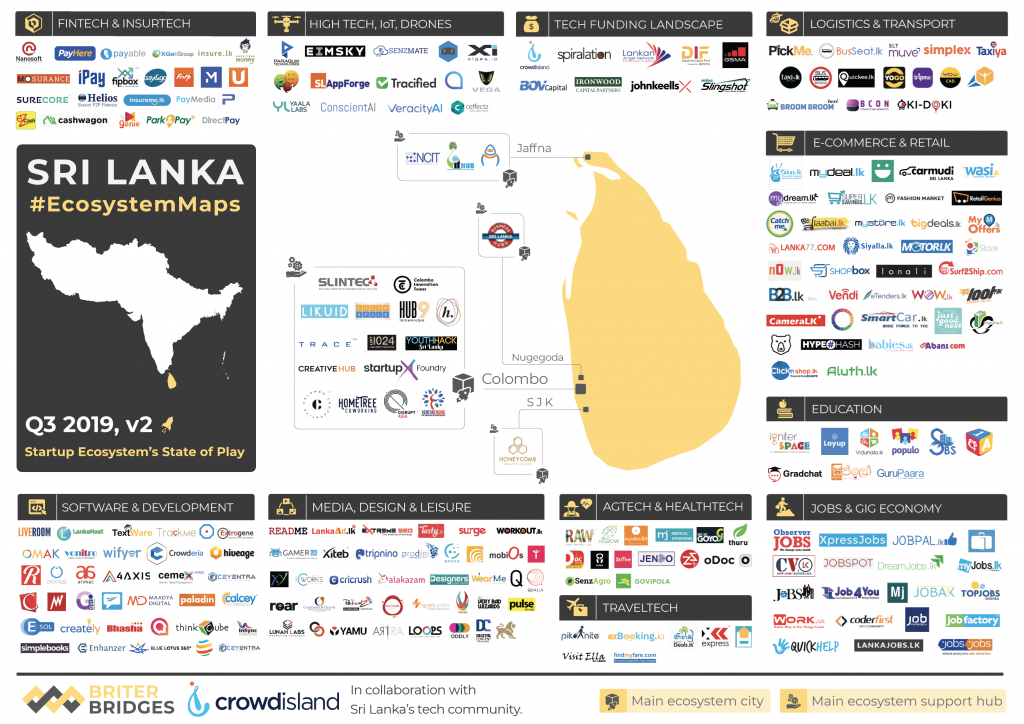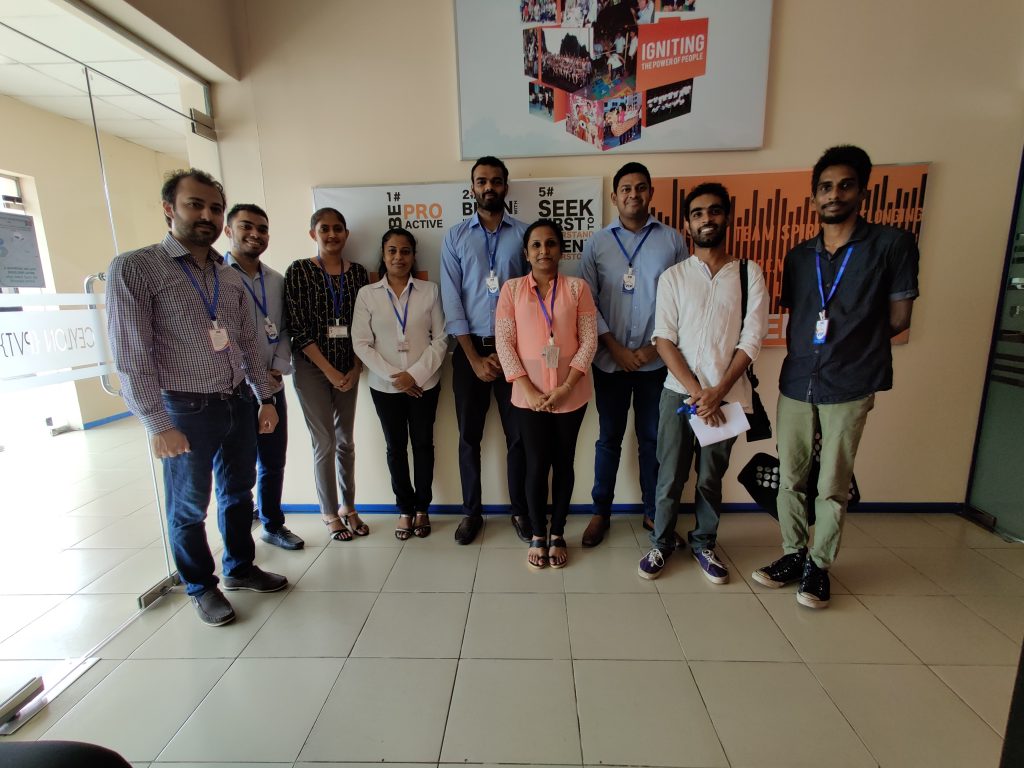It’s been almost two years since our last piece on the Sri Lankan tech ecosystem. Between 28 August –1 September 2019, Bilal Ali Qureshi from the GSMA Ecosystem Accelerator team, visited Sri Lanka to meet with key ecosystem builders and to support oDoc, one of the Ecosystem Accelerator Innovation Fund start-ups. In this blog, we explore the new developments in the Sri Lankan tech ecosystem and reflect on oDoc’s progress since we began working with the start-up back in December 2018.
Strong technical talents are fuelling scalable start-ups
The Sri Lanka tech ecosystem has come a long way in the last four years. The highly talented tech resources of this South Asian island has produced tech solutions that are now used in organisations such as eBay, Uber, the London Stock Exchange and Paypal.
Strong technical talent is the key driver behind the new wave of start-ups that have graduated from early stage and are scaling across the country. Ranging from ride hailing services like Pick Me, hospitality player YOHO Bed, booking platform such as Express 418 to e-commerce players like Kapruka.com and Takas, they are all examples of start-ups that were launched in the recent past and are doing exceptionally well. After attaining success in Sri Lanka, these start-ups are now looking beyond borders.
While the tech ecosystem is thriving, the growth of Sri Lankan start-ups is limited by the country’s population size of 22 million people. Start-ups, that have gained some traction due to the strong demand-side acceptability in the local markets, are now working on how to sustain their growth. Many of the start-ups are now look upon a promising huge next-door Indian market which brings both opportunities and challenges.
High demand for digital services among consumers
With the increase in mobile service and mobile internet penetration, Sri Lanka is experiencing a growing trend in the use of mobile applications, especially in the e-commerce, logistics and health space. The mobile market is a competitive one which is served by four mobile operators (Dialog, Mobitel, Hutch and Airtel) with over 15 million unique mobile subscribers, over 14 million smart phones in use and nine million mobile internet users, according to GSMA Intelligence.
Overall, the tech space is highly supported by mobile network operators. In 2017, Dialog launched a $15 million Venture Capital fund to invest in Sri Lankan-based digital companies. The fund to date has invested into promising start-ups such as Mydoctor.lk, Insureme.lk, and Roar Media. Moreover, Dialog offers a unique opportunity to tech start-ups and developers by providing a platform called Ideamart which connects to Dialog, Airtel and Hutch’s APIs. The platform allows developers to use features based on IdeaPro, where the scripts to APIs are shared for them to create applications though IdeaApps is comprised of pre-loaded applications for a content provider. The AllApps Appstore presents the applications that are published for the benefit of the general public. It also presents the platform for publishing Android and JAVA based Applications for developers.
Tech hubs are serving as the backbone and support systems for start-ups
The tech hub community in Sri Lanka is ever growing. We came across ‘CITRA Labs’, established as a first public sector innovation Lab jointly with the Ministry of Science, Technology and Research, and the United Nations Development Programme (UNDP). It focuses on creating socio-economic impact by catalysing tech start-ups in Sri Lanka. Furthermore, we came across John Keells X, a tech hub privately owned by Sri Lanka’s largest listed company, John Keells Holdings. The hub has a primary focus on commercially viable tech start-ups which are nourished and funded in the form of equity by John Keells.
There are also new tech hub initiatives being launched in Sri Lanka, with one of the most recent and biggest of Sri Lanka being Hatch. Hatch is based in the heart of Colombo in a seven-storey building of approximately 60,000 square feet. Operational on three floors, Hatch envisions being a 900-seat facility at full capacity.
Focused on providing genuine opportunities for entrepreneurs, it currently sits at 95 per cent occupancy and making home to start-ups like Bistec Global, Smart Logic working on software development, Sri Lanka’s fastest-growing AI-ML professional services company Veracity, and Eco360, a fast-growing start-up providing sustainable alternatives to single-use plastics. Furthermore, in creating an in-house ecosystem for entrepreneurs to thrive, Hatch has industry experts such as Crowdisland, Lanka Angel Network, PWC, and legal firms on location. In the coming year, Hatch will become a state-of-the-art makerspace which gives an opportunity for the maker scene to emerge and flourish in Sri Lanka.
oDoc: Providing primary health care via mobile technology to more than 30,000 blue collar workers
oDoc is a health-tech start-up based out of Colombo, Sri Lanka and their journey with the GSMA started when the company was selected by the GSMA Ecosystem Accelerator Innovation Fund during December 2018. oDoc primarily focuses on providing primary health care through mobile technology. It has created a revolution in the lives of blue-collar workers, especially in the garments industry where the employer pays a nominal subscription fee on a monthly basis to cover these workers for their primary health care using oDoc telemedicine services.
As of August 2019, oDoc is serving more than 30,000 blue-collar workers in Sri Lanka with a mobile application that is available on both iOS and Android platforms for patients at an individual level. The model works on a volume basis for oDoc as the pricing is very nominal, so can only make a positive business case if volumes are high. In order to ensure healthy growth, oDoc went on to test international markets and very recently they have successfully signed up a garment factory in India with 1,000 blue-collar workers. With this experience and by talking to other tech start-ups it seems the Sri Lankan market provides a great opportunity for start-ups as not only a cultivation ground but also for start-ups looking to scale have to look beyond the borders and compete internationally.
We would like to end this blog post by thanking Heshan and Nabeel from oDoc, Chalinda from crowdisland and Suneth Haputhanthri from eChanneling, along with Mobitel for being great hosts during our week in Sri Lanka.
The Ecosystem Accelerator programme is supported by the UK Department for International Development (DFID), the Australian Government, the GSMA and its members.






